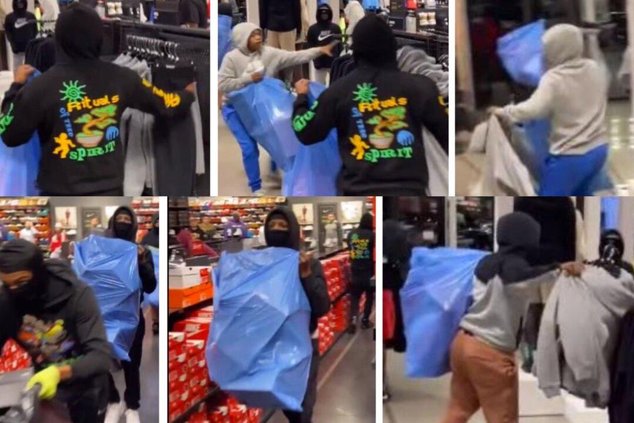London Breed is mayor of San Francisco.
One doesn’t win that office without being liberal.
That is underscored by the fact only 6.4 percent of the eligible voters in the city are registered as Republican.
Breed also is the highest profile Democrat in California actively embracing Proposition 36.
Almost every California district attorney does as well except, of course, Los Angeles’ George Gascon who embraces the outer limits and beyond of social justice.
San Francisco is struggling to address the issues of homelessness and criminals who casually stroll out of stores with hundreds of dollars in merchandise without paying.
They do so with the full knowledge Proposition 47 passed in 2014 has effectively tipped the scales of justice so far in their favor that they are on the verge of toppling.
Breed experiences firsthand every day how sections of Proposition 47 is destroying the quality of life in her city as well undermining basic law and order when it comes to making some crimes misdemeanors.
The mayor — just like those who serve as district attorneys for California’s 58 counties — also sees parts of Proposition 47 as creating a more just world.
It is why Proposition 36 on the Nov. 5 ballot does not gut Proposition 47 as much as it adjusts it.
The legislative majority along with Gov. Gavin Newsom labored hard to put a competing measure on the upcoming ballot to keep the social justice agenda intact
They ended up dropping it.
It would be too big of a stretch to guess whatever polling they did showed it would be a major flop even in a deep blue state like California.
Some say it was an attempt to muddy the waters by finding wording that would mislead voters fed up with what one might consider penny ante crime in the overall scheme of things so they wouldn’t vote for Proposition 36.
But the truth is likely more complicated.
Proposition 36, if passed, will throw a wrench into Sacramento’s plan to clear out and close down as many state prisons as possible. The legislative analyst’s assessment of the ballot measure says as much.
Passage could also provide a partial answer to Newsom’s lament that the state has doled out $20 billion plus to local governments over the past five years to combat homelessness but there is little to show for it.
A lot of those released from prison or who have avoided going there thanks to Proposition 47 have ended up on the street and/or are supporting themselves — you can read that as funding their drug buys in many cases — by stealing.
Newsom was right that incarceration doesn’t work in rehabilitating criminals.
Exclude murderers, rapists, and others that conduct the most heinous crimes from the equation and any reasonable person can buy into the governor’s observations about “non-violent” criminals that are put behind bars.
But here’s the obvious problem with Newsom’s avoid prison at all costs plan: How are said criminals being rehabilitated?
The short answer is the overwhelming majority are not being rehabilitated.
There are plenty of ways in place that can be done that might require expansion.
But there is no way to force those that need such help to get it.
Newsom, with the full backing of the legislative majority by their looking the other way, never provided any hammer to allow local jurisdictions to deal with drug-related crime that assured rehabilitation would be in play out of the gate whether perpetrators wanted it or not.
Much of the public’s attention has been focused on the adjustments being offered for theft crime.
Arguably, though, when it comes to changing the game is how it would alter the treatment of drug-related crimes.
It would allow, in some cases, people who possess illegal drugs to be charged with a “treatment mandated felony” instead of a misdemeanor.
This would apply to people who possess certain drugs such as fentanyl, heroin, cocaine, or meth. And they also would have to have two or more convictions for drug crimes such as possessing or selling drugs.
They would generally get treatment such as for mental health or drug addiction.
Those who finish treatment would have their charges dismissed. Those who do not finish treatment could serve up to three years in state prison.
The change would undo some of the punishment reductions implemented under Proposition 47.
Courts would be required to warn people convicted of selling or providing the previously mentioned drugs that they could be charged with murder if they sell or provide drugs to a person going forward and they die.
This would make it more likely for them to be convicted of murder if they subsequently provide or sell drugs to a person that then dies from using them.
Proposition 36 would require someone convicted of selling fentanyl, cocaine, heroin, meth, and such to serve time in prison or county jails.
It would also lengthen sentences based on the amount of drugs they sell.
As such it carved out a different penalty for some small time drug dealers as opposed to larger operators. That clearly passes the social justice litmus test.
The ballot measure would also allow the lengthening of up to three years of sentences for those convicted of theft or property damage if they were one of three or more working in concert to commit the crime.
The biggie, of course, is the $950 and below threshold that keeps thefts misdemeanors under Proposition 47.
Proposition 36 doesn’t lower the $950 threshold. It keeps it.
But it makes stealing something of value individually or collectively $950 and under a felony if the person has two or more convictions for certain theft crimes such as shoplifting, burglary, and carjacking.
To make it clear, it allows someone to commit two burglaries where the value of the items stolen each time is $950 and under and only be subjected to a misdemeanor.
But on the third strike, they can be charged with a felony.
That is giving offenders not just a second chance but a third chance. If they break the law a third time and are convicted they can get up to three years in county jail or prison.
It is clearly more reasonable than throwing the book at them on the first two convictions and locking them away for 10 years or more under the old Three Strikes law that Proposition 47 neutered.
And is certainly more just than having people’s property and sense of security plundered repeatedly by criminals.
This column is the opinion of editor, Dennis Wyatt, and does not necessarily represent the opinions of The Bulletin or 209 Multimedia. He can be reached dwyatt@mantecabulletin.com.









